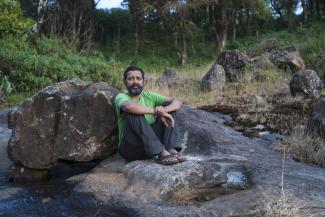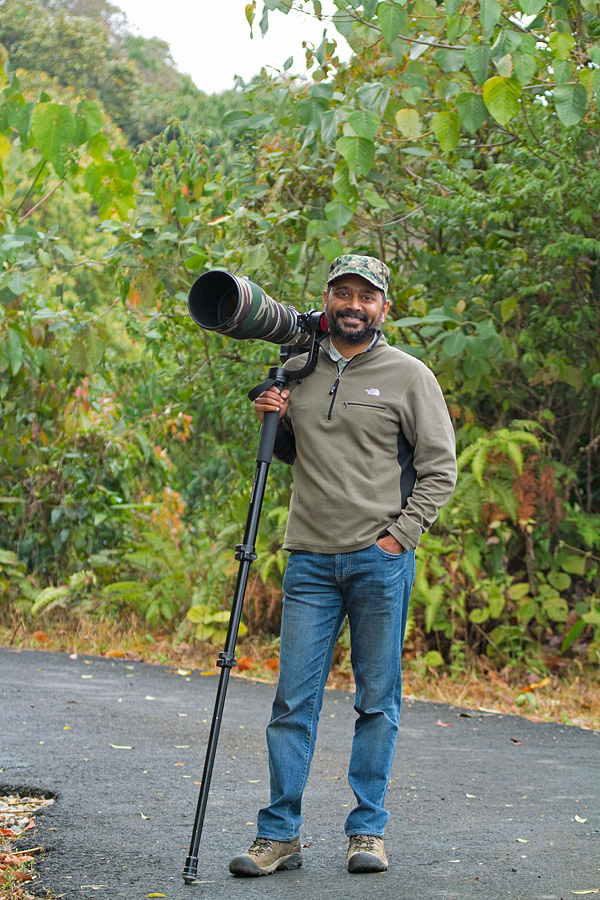
Ramki Sreenivasan was diagnosed with Stage IV lung cancer in 2017. Along with initial brain radiation, targeted therapy, he embraced the spirit and practices of yoga passionately for healing and recovery. Here he advocates the vast potential of yoga in cancer management.
I am an avid wildlife photographer and passionate conservationist. I am out in the wild most of the time.
Trek to Sikkim
The year 2017 was life-changing. In November, I had gone on a solo trip to the mountainous region of Sikkim to track Red pandas, the highly endangered state animal. I was traversing high altitude with low oxygen and heavy equipment. The cold had just started setting in. I was in a blissful frame of mind, in one of the most beautiful corners of India. I had finished my work and was returning to my hometown in Bangalore.
When I got back, I felt something minor bothering me. I couldn’t really put a finger on it. I thought I felt a little uneasy in the throat, though I had no cough. I went to a nearby ENT. She checked my throat and chest, but found nothing wrong. She suspected a tummy issue since I had been eating out for long, and prescribed a five-day course of antacids. I took the medication but didn’t get any relief.
Surprising lung cancer diagnosis
Anyway, there were other areas of discomfort that required more immediate attention. I had a knee strain from climbing and trekking that had to be addressed first. I had booked an appointment for physiotherapy sessions at Manipal Hospital. After one my sessions, and yet another ENT consultation later, I was informed that I could probably visit the pulmonologist across the corridor for my throat issue. The pulmonologist asked for an x-ray of my chest. When the report came it showed some abnormal clouding in my right lung. I was bluntly told, “You could go in one of the two directions: One is TB and the other is Onco.”
A biopsy quickly revealed adenocarcinoma and I was advised a PET scan. The PET report was frightening. I was diagnosed with Stage 4 lung cancer. The cancer had spread or metastasised across several key sections of the body. There were some lymph nodes in my collar bone acting up, which I had ignored earlier. And my brain had more than a dozen lesions. I could have easily died on any one of my trips!
The diagnosis was totally out of the blue. One day I had been blissfully walking around in the wild in Sikkim, and a few days later I had been detected with life threatening lung cancer. The worst part was that I had no clue, no symptom. It was an anomaly because I have been an extremely healthy person all my life. I have never had any health issue. In my 45 years I don’t recall ever going even for a blood test. It also caught me off- guard because I am quite mindful of my physique, constitution and dietary habits. I was an ardent yoga practitioner, a runner, besides being a wildlife enthusiast. I have been a vegan, a staunch one, for the last ten years. I am a non-smoker. But I had a heightened awareness of my body and this probably helped in checking out the vague symptoms. Anyway, I was going through all the tests and check-ups in a state of stupor, not knowing, not registering what was happening.
Radiation therapy
I had to address the lesions in my brain as soon as possible. The oncologist started radiation therapy the next day after he saw my reports. That was a very critical intervention because the lesions were all over my brain. I could have faced any brain related side effect, but surprisingly I was totally asymptomatic. I had no headaches, no nausea, no seizures, no numbness and vision changes.
ROS1 Lung Cancer
So while my 10-day radiation was in progress, we requested the hospital to send my tissue samples extracted from a shoulder lymph node (a minor surgery) to FoundationOne in the USA for mutation markers, to aid further diagnosis and treatment. This is a critical step and I would recommend all patients to discuss this option with their oncologist. It uses CGP (Comprehensive Genomic Profiling) to search 324 genes for cancer-relevant mutations in the DNA of your tumour to help identify if there is a targeted therapy, immunotherapy, and clinical trial option that may be right for you. It is really beneficial to understand what specific disease and treatment options lie ahead.
The biomarker or genetic makeup testing determined my lung cancer to be ROS1-positive. ROS1 is a rare type of non-small cell lung cancer (NSCLC) caused by a defective gene and is related in many ways to ALK positive lung cancer. It is aggressive, commonly spreads to the brain, and usually diagnosed at an advanced stage – all of which happened in my case.
The heartening bit was that with ROS1 detection, I could begin with targeted therapy right away. Dr. Amit Rauthan, HOD & Consultant - Medical Oncology at Manipal, prescribed two tablets of Crizotinib, (a targeted therapy treament) a day as part of the regimen. I did not have to undergo any chemotherapy, or surgery, which was a relief, in a way.
Yoga rehabilitation for cancer
Patients diagnosed with cancer should explore integrating yoga into their recovery as soon as possible. Yoga is not a ‘feel good’ factor but a powerful aid in healing by bringing balance to mind and body. It is to be noted that Integrated therapy for Cancer is becoming mainstream globally. One of the pioneers in the field being the MD Andersen Centre in Texas – the largest cancer hospitals in the world.
And so I started yoga therapy – in a big way.
I have always been a passionate student of yoga and love its multiple benefits and scientific framework. Prior to 2017, I would practice yoga thrice a week, one and a half hour each time. But during cancer rehabilitation, I was doing yoga three times a day, every morning, afternoon and evening. It was fairly intense work. And I must say that it played a paramount role in my healing. I have now started believing in its doctrines and wisdom even more resolutely.
A person who has been largely instrumental in shielding me from the harsh psychological, emotional and physical impact of my cancer, has been my yoga guru and doctor, Dr. Naveen Visweswaraiah, an Integrative Medicine physician and a yoga researcher. He softened the blow considerably for me. As he has associations with the hospital, it was he who broke the news to me that it was Stage 4 - the most advanced stage of lung cancer. I remember he had paused for a long time before adding: ‘And - there is no stage 5.’ At that time, I had no clue as to what stages were. All of my 45 years I had been happy in my wildlife pursuits, oblivious of medical predicaments. When you walk out of a diagnostic centre or a hospital with a frightful report, you need someone to guide you through the maze. You need someone informed and compassionate to be next to you, to be with you. Therefore I surrendered completely to Dr Naveen.
He said that we start working on it from today. So the next day after radiation, I started with a disciplined schedule of yoga. I was following a lot of techniques on breathing, mind sound resonance, pranic energy healing and meditation, relaxation techniques.
I was also greatly influenced by a book ‘Yogic Management of Cancer’ written by Dr.Swami Nirmalananda who is based in Bihar School of Yoga, Munger. The book explains cancer and its causes in a practical way, in light of modern scientific understanding and the yogic / spiritual perspective. I embraced some of relaxation and meditative principles of the Bihar School which were exceedingly beneficial – like Yoga Nidra, Antar Mouna, etc.
I feel since yoga is so holistic, integrative and multidisciplinary, it has invaluable and immeasurable potential for healing and supporting treatment. It should be definitely closely assimilated and unified with modern medical beliefs and practices.
Related Reading: Yoga for Quality of Life of Cancer Patients and Survivors
A very useful guide book is ‘Anticancer Living: Transform Your Life and Health with the Mix of Six’ by Lorenzo Cohen and Alison Jefferies. I strongly urge patients to adopt the lifestyle suggested in the book to accelerate healing.
Caregiving
Caring for a person with cancer can be hard emotionally and physically. However, there can also be moments that are comforting and rewarding. Typically, the person is a spouse or a close family member and I was so fortunate my wife Swarna was my primary caretaker. She took care of so many things, especially in the early stages that were vital for treatment and recovery. Among a long list of things she managed:
- Finalising a clear path for treatment - this can be tricky given the various opinions of doctors and non-doctors
- Overall monitoring and providing comfort for the patient
- Ongoing help with medical care
- Looking at financial and insurance issues
- Constantly communicating between the patient and the health care team as well as well-wishers.
Wildlife for Cancer initiative
While going in and out of hospitals for treatments, a cruel reality hit me hard – cancer is a universal disease, but its treatment is not affordable to all. Some can’t even afford a diagnosis, let alone start treatment! It was then that I knew I wanted to do something to change this reality.
I have been photographing India’s wilderness for over two decades. I had never been a commercial photographer, but now, I saw an opportunity to use my wildlife photographs for a cause. And thus was born the idea of Wildlife For Cancer – an online platform where visitors can buy large and high quality prints of my photographs, which can directly fund cancer treatment for the needy.

Present health
I am doing fine now with 6-monthly reviews. The research and the FDA drug approvals for the treatment for cancer is on the fast lane - which is great news for us patients as mortality will keep falling for most cancers. By adding other safety checks like yoga and healthy lifestyle patients can (more or less) live a normal life.
Advice
As a patient, I would say treat and think of cancer as just another disease (it is), do some research (not too much), be nice to your caregiver, press the reset button and prioritise what you truly want to do for the rest of your life!
(Ramki Sreenivasan is a Bangalore-based technology entrepreneur, wildlife photographer, and co-founder of Conservation India.)






